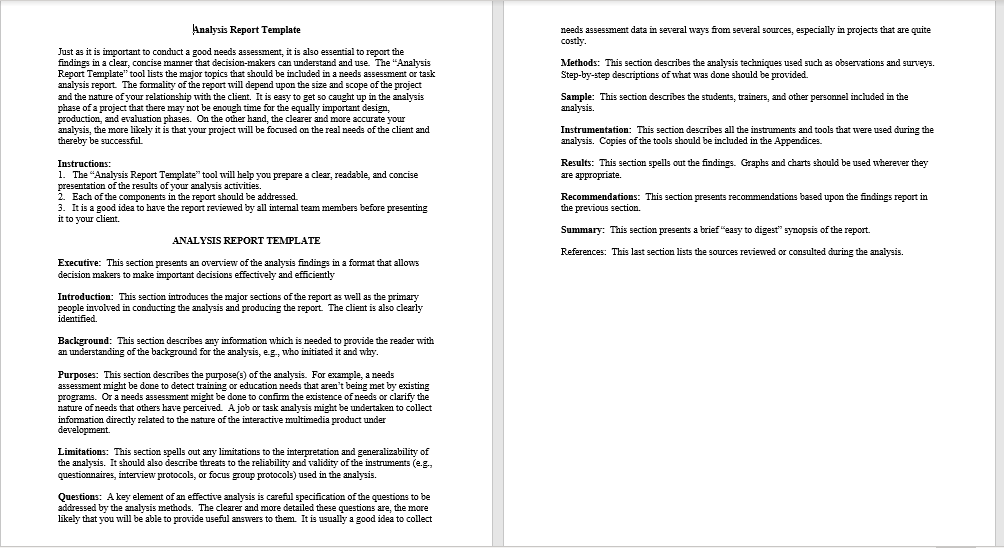Analysis Report Template needs assessment data i several ways from several sources, especially in projects that are quite costly. Just as it is important to conduct a good needs assessment, it is also essential to report the findings in a clear, concise manner that decision-makers can understand and use. The "Analysis Methods: This section describes the analysis techniques used such as observations and surveys. Report Template" tool lists the major topics that should be included in a needs assessment or task Step-by-step descriptions of what was done should be provided. analysis report. The formality of the report will depend upon the size and scope of the project and the nature of your relationship with the client. It is easy to get so caught up in the analysis Sample: This section describes the students, trainers, and other personnel included in the phase of a project that there may not be enough time for the equally important design, analysis. production, and evaluation phases. On the other hand, the clearer and more accurate your analysis, the more likely it is that your project will be focused on the real needs of the client and Instrumentation: This section describes all the instruments and tools that were used during the thereby be successful analysis. Copies of the tools should be included in the Appendices. Instructions: Results: This section spells out the findings. Graphs and charts should be used wherever they 1. The "Analysis Report Template" tool will help you prepare a clear, readable, and concise are appropriate presentation of the results of your analysis activities 2. Each of the components in the report should be addressed. Recommendations: This section presents recommendations based upon the findings report in 3. It is a good idea to have the report reviewed by all internal team members before presenting the previous section. it to your client. Summary: This section presents a brief "easy to digest" synopsis of the report. ANALYSIS REPORT TEMPLATE References: This last section lists the sources reviewed or consulted during the analysis. Executive: This section presents an overview of the analysis findings in a format that allows decision makers to make important decisions effectively and efficiently Introduction: This section introduces the major sections of the report as well as the primary people involved in conducting the analysis and producing the report. The client is also clearly identified Background: This section describes any information which is needed to provide the reader with an understanding of the background for the analysis, e.g., who initiated it and why. Purposes: This section describes the purpose(5) of the analysis. For example, a needs assessment might be done to detect training or education needs that aren't being met by existing programs. Or a needs assessment might be done to confirm the existence of needs or clarify the nature of needs that others have perceived A job or task analysis might be undertaken to collect information directly related to the nature of the interactive multimedia product under development. Limitations: This section spells out any limitations to the interpretation and generalizability of the analysis. It should also describe threats to the reliability and validity of the instruments (e.2., questionnaires, interview protocols, or focus group protocols) used in the analysis. Questions: A key element of an effective analysis is careful specification of the questions to be addressed by the analysis methods. The clearer and more detailed these questions are, the more likely that you will be able to provide useful answers to them. It is usually a good idea to collect







